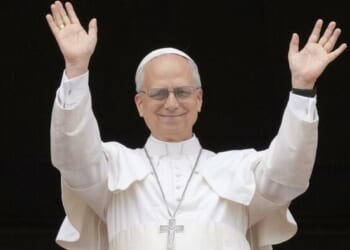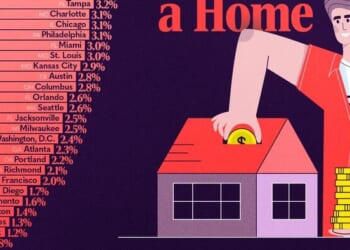
Earlier this fall, bribery allegations against Karina Milei, President Milei’s sister and closest adviser, damaged Milei’s image as a political outsider tasked with challenging the country’s corrupt establishment. LLA also lost heavily to Peronist opposition in Buenos Aires’ provincial elections last month—a signal that the government’s reform agenda might be losing support among the Argentine people. This defeat triggered widespread uncertainty in global markets about the prospects of Milei’s government and led to a sell-off of the peso. On the verge of yet another monetary crisis, Milei turned to the White House for help, and last week, the U.S. Treasury threw Milei’s drowning government a life preserver. The two countries’ $20 billion currency swap line briefly stabilized the Argentine economy as voters headed to the polls over the weekend. And shortly before the election, José Luis Espert—Milei’s top candidate for the nation’s key battleground region, Buenos Aires Province—resigned over his financial ties to an alleged drug-trafficker.
But as ballots were counted across Argentina on Sunday evening, an unexpected result emerged. Milei’s party, contrary to recent expectations, won big—a signal that much of the country is still on board with the free market crusader’s ambitious reform agenda. As of this morning, LLA had received 41 percent of the votes nationwide with more than 99 percent of ballots counted, beating the closest opposition party by nearly a 10-point margin. More crucially, LLA gained 64 seats in the lower house. This crosses the critical one-third threshold, letting LLA block opposition bills and back presidential decrees. Milei’s legislative gains create an opportunity to pursue the deeper structural reforms economists say Argentina needs—if he can build the political coalitions his go-it-alone approach has so far avoided.
Milei—a libertarian economist—ran for Argentina’s presidency amid prolonged economic stagnation and runaway inflation. By 2023, the country’s economy had not seen meaningful growth for more than a decade, and annualized inflation was climbing quickly into the triple digits. Under President Alberto Fernández’s Peronist coalition, which won the presidency in 2019, Argentina was racing toward uncontrollable hyperinflation, debt default, and economic collapse.
“There was a sense that there was a need for radical change,” Emilio Ocampo, an Argentine economist and historian at the University of CEMA in Buenos Aires, told TMD. “And the only person who embodied that possibility was Javier Milei.”
Within his first months in office, Milei cut the number of government ministries in half, fired thousands of state employees, and implemented hundreds of deregulations. He entered office in December 2023 promising to cut down Argentina’s chronically high government spending and expansive regulatory regime. By the end of 2024, Milei had cut government spending by around 30 percent. Argentina recorded its first budget surplus in more than a decade.
Milei’s reforms weren’t only successful for the country’s balance sheet. Poverty in Argentina decreased from more than 50 percent at the beginning of 2024 to below 40 percent by the end of Milei’s first year in office. GDP growth also rebounded, with the OECD estimating that Argentina’s economy will grow by 5.2 percent in 2025 and 4.6 percent in 2026, up from contractions of 1.9 percent and 1.3 percent in 2023 and 2024. The government’s elimination of rent controls also sparked a revival in the country’s housing market. Real rents have fallen by almost a third, and rental supply has tripled.
Many economists credit Milei with achieving what much of the field thought was all but impossible for Argentina—quick, substantive reform. “He addressed the fiscal and institutional side of the equation,” Monica de Bolle, an economist at the Peterson Institute for International Economics, told TMD. “What he did was commendable—very deep and very ambitious reforms. And he was actually able to do them, which is surprising.”
But there is also a growing consensus that Milei’s successes are still partial. “All these deregulations that we hear about, they are great, but they are not the big reforms, the big regulations,” Nicolas Cachanosky, an Argentine economist at the University of Texas at El Paso, told TMD. According to Cachanosky, several much larger systemic reforms are still needed for the fiscal and deregulatory achievements of the Milei government to truly change the country’s long-term trajectory—most notably, reforms to welfare programs, labor market regulation, and taxes. “Those are much deeper structural changes than the ones we’ve seen so far,” Cachanosky said.
While Milei has successfully stabilized Argentina’s economy—at least for the time being—he has done so without much support from the country’s bicameral National Congress. As a result, Milei has leaned heavily on reforms that he can implement through executive decrees, which, like executive orders issued by American presidents, lack the durability of formal legislation. “Once you stabilize the economy, you need to pass new bills—tax reform, pension reform, labor reform—things that would improve your competitiveness over time,” Sergio Berensztein, a Buenos Aires-based political analyst, told TMD.
Argentina’s other looming challenge is its idiosyncratic currency regime. Most Argentines actually save, price, and spend in U.S. dollars, rather than the country’s legal currency, the peso, which they don’t trust. This makes Argentina particularly vulnerable to dollar shortages during periods of economic uncertainty and dramatically limits the government’s monetary capabilities. Many economists believe that the only feasible way out of this is through official dollarization—a strategy that Milei initially embraced during his presidential campaign.
“This is an economy that is already de facto dollarized,” Ocampo, who has advised Milei on dollarization efforts, said. “Official dollarization in Argentina is simply a recognition of a fact.” However, Milei’s support for dollarization appears to have soured—or at least stalled. His government has not made any substantive moves toward adopting the dollar as the country’s legal currency, and in the run-up to yesterday’s election, Economy Minister Luis Caputo told news channel LN+ that “Dollarization could be an alternative, but for now it is off the table.” In part, he explained, this is because “we don’t have enough dollars to guarantee a successful dollarization.”
But, de Bolle told TMD that “If [Milei] doesn’t do anything about the monetary regime that Argentina has, eventually he’s going to face the same problem that his predecessors faced.”
Milei’s name was not on yesterday’s ballots, but his ability to pursue further reforms to the country’s political and economic institutions certainly was. For durable changes to Argentina’s labor, tax, welfare, and monetary systems to have any chance of passing through a divided National Congress, Milei’s libertarian La Libertad Avanza party needs to both nurture support among the Argentine public and build effective political coalitions.
Passing that one-third threshold and becoming the biggest party in the lower house gives LLA far more legislative power. But it’s still a minority party that needs to form political coalitions to pass more durable legislation. “Milei needs to build alliances and consensus with the moderate forces both in the [legislature] … And Milei is not that kind of politician,” Berensztein said. “There is a big ‘if’, whether Milei is going to be willing, able, and effective in building bridges with opposition leaders, which is instrumental for him to be able to implement structural reforms.”
According to Carlos Gervasoni—a professor of politics at the Universidad Torcuato Di Tella in Buenos Aires—both Argentines at home and investors abroad will be watching closely for signs that a coalition capable of pushing further reform is beginning to take shape. “Is he going to try to build the coalition that he has not built so far, or is he going to try to keep ruling by himself?” Gervasoni told TMD. “The second option is a recipe for disaster—the first is the only viable way for [Milei] to end his presidency in good shape.”
The stakes are high. Without a legislative coalition, Milei’s bigger reforms can’t proceed, and Argentina risks falling backward into the economic dysfunction that it has spent the past two years trying to escape. But during his Sunday night victory speech at the LLA’s electoral headquarters, Milei was jubilant but not confrontational, and explicitly stated his willingness to work with opposition parties. “There are dozens of deputies and senators from other parties with whom we can find basic agreements,” he told the crowd. “We want to invite most of the governors who will have legislative representation to discuss these agreements together.”
Regardless of his choices in the coming weeks, his party’s midterm victory demonstrates that the novice politician is still capable of surprising both his supporters and detractors. “Milei proved again that he is unmatched in pulling rabbits out of his hat,” Ocampo said. “Shorting him has proven to be a terrible investment so far.”

















